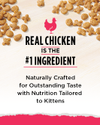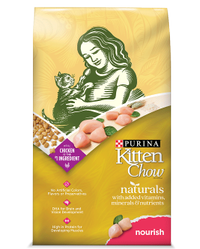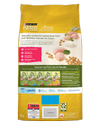





Kitten Chow Naturals Kitten Food
Earn 10 reward points for every $1 you spend!
Highlights
- Made with real chicken as the #1 ingredient
- Naturally crafted for outstanding taste & nutrition
- Made with savory real chicken and a flavorful taste kittens love
- High in protein for developing muscles
- No artificial colors, flavors or preservatives
- DHA for brain and vision development
Product Description
With real chicken as the first ingredient, Kitten Chow® Naturals dry kitten food provides your kitten with the natural nutrition she needs —including essential nutrients like those found in mother’s milk. The protein-rich formula also promotes muscle growth and is enriched with DHA to foster brain and vision development. And with antioxidants to support immune health.
And for added peace of mind, you can count on us to craft every batch the right way. That means with responsibly sourced ingredients, expertly prepared recipes produced in Purina-owned facilities and proven formulas developed by passionate scientists and nutritionists. It’s all part of our commitment to keep your cat looking and feeling their best.
Feeding Guide
Use our pet food calculator to get a personalized feeding guide for your dog or cat.
Calculate NowRecommended Daily Feeding Amounts
Feeding Kittens
Kittens generally nibble solid foods at 3 - 4 weeks of age. Keep moistened Purina Kitten Chow Naturals available to these kittens at all times. Just add one part liquid to three parts Purina Kitten Chow Naturals, changing frequently to ensure freshness. After weaning, at 6 - 8 weeks of age, kittens will normally eat dry or moistened food at will. Start a self-feeding program, leaving food in dish at all times. Feeding amounts should be adjusted as necessary to help your kitten maintain an ideal body condition. Because kittens continue to develop throughout their first year, it’s important that they get the extra nutrition of Purina Kitten Chow Naturals for a full 12 months. After one year of age, transition to the Purina Cat Chow Naturals formula that’s right for your cat.
Feeding for Reproduction
Purina Kitten Chow Naturals provides the extra nutrition needed by reproducing females in stages of gestation and lactation. Food consumption may vary during gestation, so feed the amount needed to maintain the pregnant female’s good body condition. Food intake may double or even quadruple during lactation.
Feeding Tip
Changes in your cat’s diet should be made gradually to allow your cat to become accustomed to a new food. Substitute small amounts of the new food for the old food, gradually increasing the amount of the new food while decreasing the old food, over a period of 7 - 10 days. This gradual transition will help avoid dietary upsets.
Provide adequate fresh water in a clean bowl daily.
For your pet’s health, see your veterinarian regularly.
Calorie Content (calculated)(ME):
3822 kcal/kg
406 kcal/cup
For a list of all feeding recommendations, Download the full recommended feeding table (PDF).
